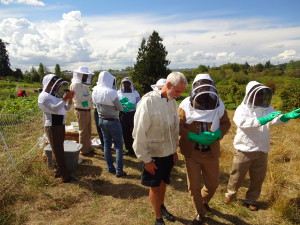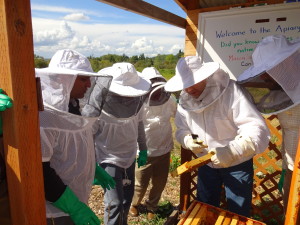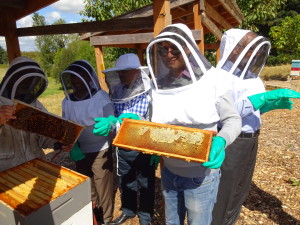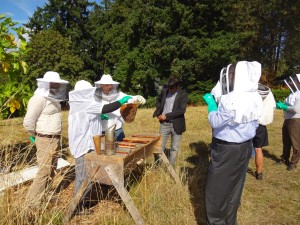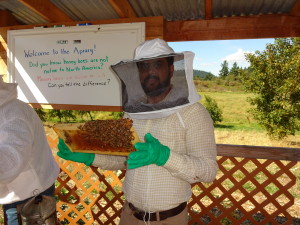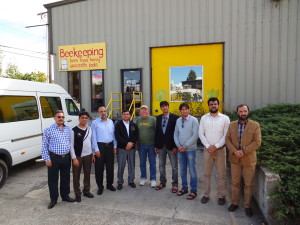How Bees use Sound/Vibrations to Communicate
- Paul Longwell
- Cornell University Master Beekeeper
- Montana University Master Beekeeper
- Washington State Master Beekeeper
Paul first developed his interest in bees at a young age while watching the commercial beekeepers’ hives on his aunt’s farm in Yamhill Oregon. After a long career serving in the Army and as a public employee, his love and interest in keeping and working with bees raised back to the forefront in 2008.Paul first developed his interest in bees at a young age while watching the commercial beekeepers’ hivesPaul first developed his interest in bees at a young age while watching the commercial beekeepers’ hives on his aunt’s farm in Yamhill Oregon. After a long career serving in the Army and as a public employee, his love and interest in keeping and working with bees raised back to the forefront in 2008.
An avid beekeeper and member of the Olympia Beekeepers Association, Paul enjoys teaching and sharing his love of bees. As a Montana and Washington state master beekeeper, Paul has gained experience in both Langstroth, Top-Bar and Slovenian AZ hives. He noticed how the local maritime winter weather influenced his honeybees and beehive losses. Paul’s research for solutions lead him to better understand the Slovenian bee houses and AZ hives. Discovering better honeybee health and longevity, Paul converted a storage building into a bee house and installed several AZ-type hives.
Additional Details
Paul actively shares his knowledge by giving beekeeping presentations in-person, during podcasts and Zoom classes. He has taught several beekeeping classes for the Washington State Beekeeping Association, including the apprenticeship course to inmates at Cedar Creek Prison. Paul also serves as one of the clubs’ mentors to new beekeepers. He serves on the Thurston County Fairgrounds and Event Center board.
Along with his wife Penny Longwell who is a master gardener, they co-developed the Pollinator demonstration garden at the Thurston County Fairgrounds and Event Center. They also offer pollinator classes for the local Master Gardener Interns.
References
1.Response characteristics of vibration-sensitive interneurons related to Johnston’s organ in the honeybee, Apis mellifera. Hiroyuki Ai, Jürgen Rybak, Randolf Menzel, Tsunao Itoh. First published: 06 May 2009 https://doi.org/10.1002/cne.22042
2. Transmission Of Vibration Across Honeycombs and Its Detection By Bee Leg Receptors, D. C. Sandeman, J. Tautz, M. Lindauer J Exp Biol (1996) 199 (12): 2585–2594. https://doi.org/10.1242/jeb.199.12.2585
3. The vibration signal, modulatory communication and the organization of labor in honeybees, Apis mellifera. Stanley S. Schneider and Lee A. Lewis Apidologie 35 (2004) 117-131. https://doi.org/10.1051/apido:2004006
4. Relationship between Relative Hive Entrance Position and Dance Floor Location (2014). Corrigan, Chelsea E., Undergraduate Honors Theses. Paper 474. https://dc.etsu.edu/honors/474
5. The Use of the Vibration Signal and Worker Piping to Influence Queen Behavior during Swarming in Honey Bees, Apis mellifera. Pierce, A.L., Lewis, L.A. and Schneider, S.S. (2007), Ethology, 113: 267-275. https://doi.org/10.1111/j.1439-0310.2006.01314.x
6. 32 Vibratory and Airborne-Sound Signals in Bee Communication (Hymenoptera) https://www.researchgate.net/publication/268000846_32_Vibratory_and_Airborne-Sound_Signals_in_Bee_Communication_Hymenoptera
7. Sound and vibrational signals in the dance language of the honeybee, Apis mellifera. Michelsen, A., Kirchner, W.H. & Lindauer, M. Behav Ecol Sociobiol 18, 207–212 (1986). https://doi.org/10.1007/BF00290824
8. Influences of queen piping and worker behaviour on the timing of emergence of honeybee queens. H.J. Grooters Insectes Sociaux, 1987, Vol. 34, No. 3, 181-193 https://doi.org/10.1007/BF02224083
9. On the Importance of the Sound Emitted by Honey Bee Hives, by Alessandro Terenzi †ORCID,Stefania Cecchi *,†ORCID and Susanna Spinsante †ORCID, Dipartimento di Ingegneria dell’Informazione, Universitá Politecnica Delle Marche, 60131 Ancona, Italy Vet. Sci. 2020, 7(4), 168; https://doi.org/10.3390/vetsci7040168

